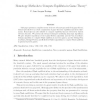24 search results - page 2 / 5 » Smoothing Techniques for Computing Nash Equilibria of Sequen... |
IPL
2006
13 years 7 months ago
2006
We present a Coq-formalised proof that all non-cooperative, sequential games have a Nash equilibrium point. Our proof methodology follows the style advocated by LCFstyle theorem p...
DAGSTUHL
2007
13 years 8 months ago
2007
This paper presents a complete survey of the use of homotopy methods in game theory. Homotopies allow for a robust computation of game-theoretic equilibria and their refinements....
ATAL
2008
Springer
13 years 9 months ago
2008
Springer
We investigate equilibrium strategies for bidding agents that participate in multiple, simultaneous second-price auctions with perfect substitutes. For this setting, previous rese...
SIGECOM
2006
ACM
14 years 1 months ago
2006
ACM
We present a reduction from graphical games to Markov random fields so that pure Nash equilibria in the former can be found by statistical inference on the latter. Our result, wh...
ATAL
2006
Springer
13 years 11 months ago
2006
Springer
We present a technique for reducing a normal-form (aka. (bi)matrix) game, O, to a smaller normal-form game, R, for the purpose of computing a Nash equilibrium. This is done by com...

